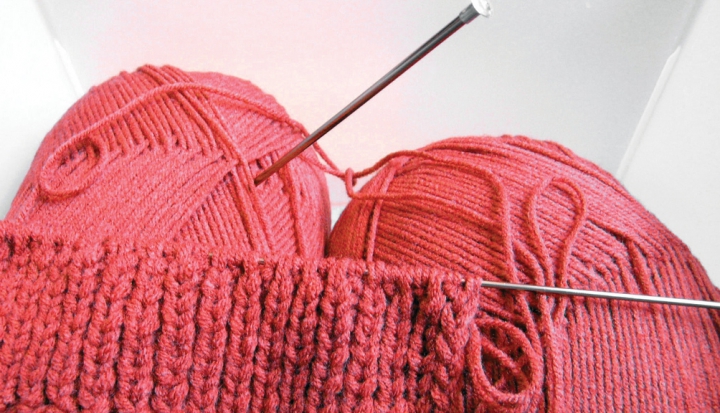I can’t remember when I learned to knit. I know it was sometime when, as a small child, I watched my mom creating a sweater or afghan and wanted to do the same. I made a scarf or two and became skilled enough to knit a simple sweater. Unfortunately, I decided I didn’t like the texture of the polyester yarn after I’d finished knitting it, so I put the pieces in the back of a closet for years.
About eight years ago, knitting came back into my life when I began working as the pastoral associate at St. Paul’s Parish in Webster, New York. My predecessor had started a prayer shawl ministry a few months earlier. Several of our members are expert knitters; a few came as novices.
That’s the beautiful thing about knitting: It requires very basic tools (two sticks and some string, more formally called “needles and yarn”) and a little basic coordination. Even a child can learn to knit with a little patience and practice. Five-year-old Hannah, who comes to our group with her grandmother, is now working on her first doll scarf.
Another wonderful thing about knitting is that the process can be as simple or complicated as the knitter desires. Even the most elaborate patterns are based on a binary wrapping code of a knit and a purl. And while it might not be immediately obvious, the practice of knitting can teach the knitter a number of spiritual lessons.
First, despite the promises of so-called “turbo” needles, hand knitting is slow, accomplished one stitch at a time. Using thick yarn may seem to speed the process, but this is really just an illusion.
Good knitting requires the yarn to be held with just the right amount of tension. Too tight and the pattern is drawn together, uneven, and difficult to work. Too loose and the form is lost, unwieldy, and distorted. I’ve found that when I get too uptight or become too relaxed, both my knitting and my spirit can be pulled off kilter. Knitting has helped me develop greater patience, concentration, and self-discipline—all characteristics of a healthy spiritual life.
Like life, knitting requires risk. The working stitches must be kept close to the edge of the needle. It’s easy to drop stitches, so I have learned to be vigilant and attentive to whatever I am working on.
Knitting has also helped me develop my imagination and vision of possibilities. Plain yarn can be worked into elaborate patterns; yarn with a great deal of texture and personality requires simpler patterns. Literally thousands of designs exist for hats, scarves, mittens, and more. Two knitters using the same needles and the same yarn can create very different results.
I have found that it helps to have a good sense of humor when knitting—or at least to appreciate an occasional surprise. One sweater came out a bit large. I try to wear it with a smile, but some day I may just unravel it and start over.
In life, I know I’ve often hoped for one thing but received another. Is this a failure, or am I being asked to recognize the gift in an unanticipated answer, an unexpected path?
While it’s nice to have a completed piece, for me the greatest pleasure comes in the knitting itself and the connection it gives me to the God who delights in creative activity. In fact, Psalm 139:13-14 tells us that God knits: “You knit me in the darkness of my mother’s womb; I am fearfully, wonderfully made.”
We may scientifically refer to the yarn as DNA, but when God knits over a nine-month period, the outcome is unique, to be treasured. God works with respect, intention, and attention, ever patient and exacting. In a sense, the knitting continues even after birth as the Spirit refines the design, guiding us along the pathways of our lives. When we make mistakes, God helps us unravel, start over, and move on.
Knitting provides one more thing: community. Although it seems to be a solitary activity, knitters seek each other out. We play off each other’s ideas and learn from others’ mistakes. At our prayer shawl gatherings we not only exchange news, but also share each other’s daily joys and support each other in times of trial or sorrow.
Also, much of what knitters produce is for others. Our shawls have been sent across the United States and overseas. They have gone to people dealing with serious illness, prolonged treatments, and impending death. They’ve been sent to comfort grieving family members. They have been gifts to those celebrating sacraments or facing turning points in their lives. Each shawl is made with the recipient in mind (even if we never meet); each is blessed with the effort and time it took to create this tangible sign of love. They all remind us of how our lives are woven together in God’s plan.
I believe if I continue to work at knitting, not only will my skill develop, but knitting’s lessons will continue to unfold over a lifetime. When I trust God to hold my life in perfect tension, to guide me in a sometimes winding path with a little fun, creativity, and companionship thrown in, I will find that my work and my life accomplish God’s purpose—sometimes despite myself.
This essay appeared in the January 2015 issue of U.S. Catholic (Vol. 80, No. 1, pages 47-48).
Image: morgueFile/jeltovski















Add comment